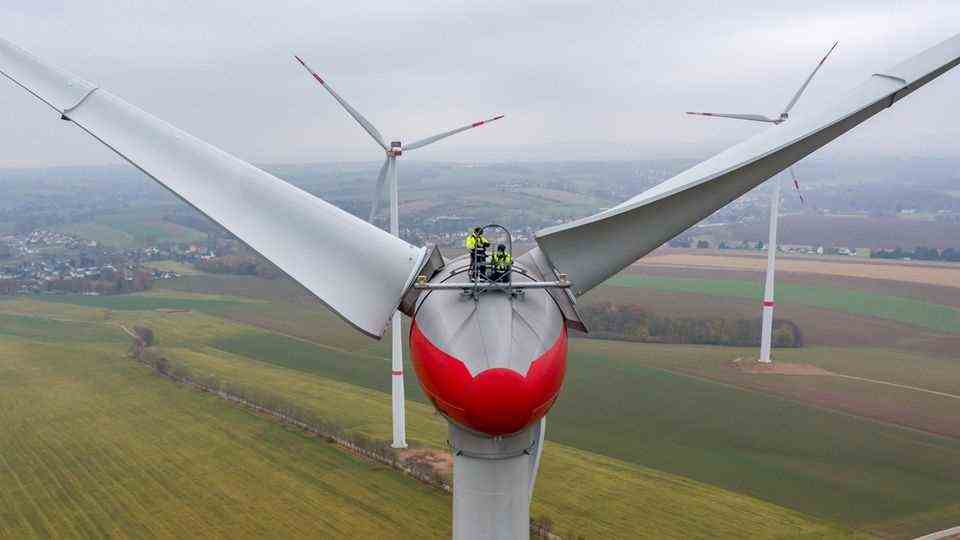Controversial EU plans
Traffic light parties unanimously oppose nuclear power – but the camps are divided when it comes to gas
Steam rises from the Gundremmingen nuclear power plant. Bavaria’s penultimate nuclear power plant went offline on the last day of 2021.
© Stefan Puchner / DPA
The EU Commission’s plans for the indirect promotion of gas and nuclear power are putting the new federal government to the test. While there is agreement on the rejection of nuclear power, opinions differ on the subject of natural gas.
The EU Commission’s plan to classify nuclear power plants as climate-friendly is facing strong headwinds from the German government. “We expressly reject the assessment of nuclear power,” said government spokesman Steffen Hebestreit on behalf of Federal Chancellor Olaf Scholz (SPD). Nevertheless, he considers possible lawsuits – such as those threatened by the Austrian government – to be largely hopeless. These would only be possible if the EU Commission had exceeded its area of competence with the regulation – but no legal action could be taken against the content, added Hebestreit. “Legally, the European Commission seems to be on safe ground.”
When it comes to natural gas, the planned classification of such power plants as eligible for funding is, according to the Hebestreit, “in line” with the attitude of the federal government, since they would be needed as a bridging technology when converting to renewable energy. The German government will now “intensively” examine the proposals of the EU Commission and then come to a “coordinated position”, according to Hebestreit.
Greens and FDP at odds over gas-fired power plants
Green Environment Minister Steffi Lemke pushed the pace: “We will now examine the EU proposal quickly and vote in the federal government,” she told the “Rheinische Post”. “We will do everything we can to exert our influence as a Federal Republic,” said Justice Minister Marco Buschmann (FDP) on Monday on TV broadcaster Welt. “The fact that the Greens naturally wish that nuclear or nuclear energy does not get a green label, I can understand – that is also counter-intuitive for many in Germany.”
The energy policy spokeswoman for the Greens parliamentary group, Ingrid Nestle, told the “Handelsblatt”: “As Greens, we cannot agree to the proposal of the EU Commission. Nuclear power can never be sustainable.” Her parliamentary colleague Lisa Badum was also skeptical about the proposals for gas-fired power plants: “Although stricter requirements for gas are now planned and, from 2035, only the use of low-carbon gases is envisaged, we still have to remain vigilant because it is natural gas that is harmful to the climate. ” She was not very optimistic that the proposal could be approved.
FDP parliamentary group leader Christian Dürr, however, pleaded for a willingness to compromise. “If we want to prevent our economy from being damaged on the way to climate neutrality, we are dependent on transition technologies. After all, the phase-out from nuclear energy and coal must be compensated for over a certain period of time,” he told the German press agency. “If it serves to protect the climate, we should be willing to compromise with regard to the use of nuclear energy in other EU countries.” From SPD party circles it was said that they are initially relying on further negotiations at EU level.
Gas, wood pellets or heat pumps: How to find the right heater for your house
9 pictures
EU Commission defends “pragmatic” plans
According to a proposal by the EU Commission, investments in new gas-fired power plants should be able to be classified temporarily as climate-friendly, especially at Germany’s request. Investments in new nuclear power plants – especially planned in France – should also be classified as green under certain conditions. The classification of economic activities, called taxonomy in technical jargon, is about the design of an EU regulation from June 2020, which is intended to direct investments more in the direction of environmental and climate protection. In future, companies will have to disclose to what extent their business practices comply with the sustainability criteria set by the EU.
The idea behind this is that investors prefer sustainable engagement. In addition, companies can advertise their products as manufactured in accordance with the EU sustainability criteria in order to reach more buyers. So-called green bonds, i.e. funds that are committed to sustainable investment, can also be based on the EU taxonomy. However, there is no obligation, nor do investors have to use the EU criteria as a benchmark for their decisions. It is difficult to quantify what economic effect the taxonomy actually has.
The EU Commission defended its approach. “We think this proposal is pragmatic and realistic,” said an official on Monday. The aim is to facilitate the transition to climate neutrality by including nuclear and gas power. The EU member states have until January 12 to comment on the draft.
Climate activists criticize EU plans for nuclear power
The plans sparked opposition from both the gas industry and environmental associations. The conditions proposed by the EU Commission made it more difficult to achieve the energy and climate policy goals by 2030, “at least they will make it considerably more expensive to achieve them,” said Timm Kehler, the board of the “Zukunft Gas” industry association, of the DPA news agency. The managing director of the Federation for Environment and Nature Conservation Germany (BUND), Antje von Broock, demanded: “Instead of investing in outdated ‘dinosaur’ technologies, we need investments in really sustainable renewable energies.” The federal government must organize the majority of EU states necessary to reject the proposal.
Government spokesman Steffen Hebestreit said the EU Commission’s plans had been discussed in advance between France and Germany, for example at the last EU summit in December. When asked whether the governments of the two countries might have agreed to accept the Commission’s proposals out of consideration for each other’s wishes, Hebestreit said: “I don’t know anything about such agreements.”


